- Home
- Skye Warren
The Queen
The Queen Read online
THE QUEEN
SKYE WARREN
Table of Contents
Cover
Title Page
Prologue
Chapter One
Chapter Two
Chapter Three
Chapter Four
Chapter Five
Chapter Six
Chapter Seven
Chapter Eight
Chapter Nine
Chapter Ten
Chapter Eleven
Chapter Twelve
Chapter Thirteen
Chapter Fourteen
Chapter Fifteen
Chapter Sixteen
Chapter Seventeen
Chapter Eighteen
Chapter Nineteen
Chapter Twenty
Chapter Twenty-One
Chapter Twenty-Two
Chapter Twenty-Three
Chapter Twenty-Four
Chapter Twenty-Five
Chapter Twenty-Six
Chapter Twenty-Seven
Chapter Twenty-Eight
Chapter Twenty-Nine
Chapter Thirty
Chapter Thirty-One
Epilogue
Thank You
Excerpt from Tough Love
Other Books by Skye Warren
About the Author
Copyright
Prologue
Damon
The winter air seeps into the cracks of my bones, the seams of my skin. There are a million places where my body has broken and reformed. A million times that I remember with each gust of wind.
Despite the temperature I have my coat open, my hands on the rail. Showing weakness isn’t an option. My heart would stop beating, my lungs would stop breathing before I shivered even once. Any hint of weakness was stamped out of me a long time ago.
The man who approaches me looks left and right. God, he’s a sitting duck if anyone wanted to shoot him. The very picture of weakness. His cheeks are ruddy, eyes red. His puffy coat must provide decent warmth, but still he rubs his hands together in his cheap knit gloves.
He comes to stand beside me, looking out over the water. “Some weather,” he says.
A sitting duck, but he’s under my protection now.
On the other side of this river is a college teaming with bright-eyed kids. Brightly colored banners decorate the staid green lawn. This far away I can’t read them, but I can guess what they say. Welcome to Orientation. Join the math club. Sign up for this sorority.
“Some weather,” I say, because I’m as much of a sitting duck as he is.
At least when it comes to this girl.
“I saw the dorm room,” the man offers. “Kind of small, but I guess that’s the way of it. Got her moved in okay. She didn’t have much stuff.”
“You’ll send her extra money,” I say softly.
Knit gloves rub together. “Right. Of course. And I’ll be doing some work for you, then?”
What kind of work do you give a man who fails at everything? What kind of work do you give the father of the girl you can’t have? “Collections.”
It’s a dirty job. A violent one. “Yes,” he says, bobbing his head. “Yes, I can do that.”
Some boys have started a game of football. I can see them chasing after each other like fucking morons from here. What must it be like to run away for sport instead of necessity? What must it be like to tackle other men for fun instead of survival?
There are people on the perimeter of the makeshift game. Maybe some boys who want to watch the action. Some girls checking out the players. Is Penny among them? Does she see something she likes?
No, she wouldn’t be there. She would have found some library by now. Some quiet place to read.
“When you gamble again…” I say, letting the thought hang in the air.
“I won’t.”
This is a lie. Of course he will. “When you gamble again, I’m not going to kill you.”
“I understand,” he says hastily, probably assuming I’m implying some kind of torture.
“I’m not going to kill you, because for reasons beyond my comprehension, that girl gives a shit what happens to you. So you had better keep it that way, old man.”
He grasps the cold railing, leaning heavily on it. “I see. And what are your intentions with her?”
It feels strange to laugh in a real way. Not the kind of pretend amusement that I walk around with on a daily basis. This laugh shakes my whole body. “Are you really going to have the talk with me?”
He looks affronted. “I have a right to ask that question. She’s my daughter.”
“You have no rights. Not the right to breathe. To eat. To sleep. You can do nothing except what I let you do. That’s what happened when she lost the game. Your life became mine.”
“That’s not real,” he says, sputtering. “This isn’t the Dark Ages.”
“The Dark Ages. What a perfect description of the time we’re living in.”
“You can’t own another person.”
Then how does Penny have such a strong hold over me? Why do I worry about her with every inhale, hope for her happiness with every exhale?
If this isn’t ownership, I don’t know what it is.
“Give me your gloves,” I say.
He looks down at his hands, clearly puzzled. I’m puzzled as well. Where does a grown man get gloves that look like they belong to a preschooler? He works it out in his head—the risks of defying me, the cost of obeying me. In the end he slowly takes off the knit gloves and hands them to me.
I take them in my bare hands, hands that have been pressed in a vice and burned on a stove. Hands that have done unspeakable violence. “Where did you get these?”
“She gave them to me,” he says, his voice raw. “They were a Christmas present a few years ago.”
And cheap enough that he kept them all this time. If she got him anything worth enough to pawn, he would have already lost them. I examine them for a moment, feeling strangely detached. How would it feel to have something so warm? How it would feel to have something from her? She picked them out herself, paid for them with the pennies she made at the diner.
Then I open my fingers and watch them fall to the water’s dark surface.
He doesn’t say a word as his gloves sink to the bottom, their outline barely visible.
“You’ll give me anything I tell you to,” I say softly. “Including your daughter.”
In the silence that follows, I can feel his struggle. The natural pride of a man, the instinctive protectiveness of a father. Both of those things rendered useless after what he did to her. I could have tied her to my bed, could have taken her a hundred thousand different ways.
And why didn’t I? That’s something I’ve asked myself a few times. Especially on cold days like this one, when I can feel every old scar and every old break. Why shouldn’t I take relief where I can find it?
Except for the memory of a little girl who loved to play with numbers the way other children play with dolls.
I move away from the railing, walking with a steady gait. One that doesn’t have a limp. Very few people know that it exists. Only Gabriel Miller, actually. “You’ll stay in Tanglewood,” I say to the man struggling to keep up with me. “And you’ll call her weekly.”
“Weekly sounds good.”
“I mean every week, not every other. Not once a month.”
He makes a sound of protest. “Okay.”
Most of the marks on my body, they were intended to hurt. Of course they would cause pain. It’s the pain that made me stronger. Breathing through it. Fighting through it.
My father didn’t want to do serious damage to my organs or my bones, the kind that would render me useless or dead. It was a kind of caring, how deliberate his abuse was.
Except when
I traded myself for the girl. That was the only time I’ve ever seen him lose his temper, truly become angry instead of simply cruel. He beat me until I couldn’t breathe, couldn’t speak.
One particular blow of his boot to my back broke my hip bone.
He tossed me into an old well with a foot of water. He left me there for so many days that he must have wondered if I died. So many days that I wondered if he had taken the girl, after all.
“And whatever else happens, you won’t speak of her to another living soul.”
He looks at me, startled. “What? Why?”
Because she’s like the limp in my step. The ache in my hands. The weakness in my body. “Because it’s the only way to keep her safe.”
Chapter One
Penny
The pile of textbooks in my small room grows and grows.
I live in a small room beneath the main floor, right next to the kitchens of a hotel. When the chef replaces their old-world chopping block with high-density polyethylene, I claim one of the slabs of wood from the discard pile. It’s heavy enough that I need help to carry it to my room, turning it sideways through the door.
We put it on the textbooks, five stacks I’ve made to match in height. I use it as my desk, finding differentials over the scarred surface, solving proofs with the faint smell of cleaning solution and cilantro the wood can’t quite relinquish.
With all these books, it’s easy to think they have everything figured out. That only a few unsolvable problems remain in the realm of mathematics, a few edge cases to keep the modern academics engaged. Before I collect them I learn how limited they are.
Dr. Stanhope is my first professor at Smith College, relatively young for his tenure, with soft brown eyes and an uneven shave. He comes to class with ink staining his square-tipped fingers, which then become covered in white chalk. He’s unlike any man I’ve known before, more of an alien creature than human, which makes him that much more relatable to me.
“Do we know all the math there is to know?” he asks on the first day. “Have we seen every arrangement of numbers there is to see? Have we seen every painting that will be painted?”
Because math, he explains, is more than just a discovery of natural laws. It’s a creative endeavor, requiring basic knowledge but also ingenuity, curiosity, and an unquenchable search for new patterns in the real and abstract universe. It wakes in me a new understanding of myself—less of a machine, more of a woman with a heart. That my heart prefers order is maybe a result of my DNA or maybe a result of my chaotic childhood.
The class I take with him is the History of Mathematics, one of the only advanced-level courses available to me over the summer. I take that alongside Introduction to Calculus and Sociology 101, unable to wait for the fall semester to begin.
I couldn’t wait to be lost in numbers, but it’s the people who capture me instead. Euler’s feverish religious beliefs and his legendary “proof” of God. Turing’s grand successes and subsequent persecution for his homosexuality, including a now banned hormonal treatment. Ada Lovelace, the only legitimate child of Lord Byron, who was the first person to recognize the potential of computers as more than pure calculation.
She described her approach as poetical science, which to me sounds perfect.
As the years pass I find more interest in literature and art than I ever had, as if the discovery of mathematics as a creative pursuit has given me permission. The numbers still call to me, as does Dr. Stanhope. He becomes my undergraduate advisor as I head into my junior year, both a mentor and a friend. A secret and painful crush, the kind of yearning for a life free from crime.
“Have you thought anymore about the research position?” he asks me in our weekly meeting, a cup of coffee in his hand, a book open on his lap as if he might dive into it at any point in our conversation. He cocks his head, the only sign that he’s waiting for a response, his gaze trained on the book.
When we started meeting, we did so in his outer office, an ancient wood table with dusty cloth-covered chairs. The same place he would hold small tutoring sessions or where his research assistants might work. Later we moved to his inner office, him behind the imposing desk stacked high with books and loose paper, and me in the swivel chair in front of him.
Now we sit side by side on the plaid couch, more comfortable for the occasional academic debates we engage in. That’s not a euphemism for anything, despite the images that sometimes invade my dreams. “I need to talk to my dad,” I say, strangely reluctant to decide.
There is no future in a mathematics degree. It needs something practical to sit on top—engineering or computer programming. By itself it’s about as useful as an art degree in terms of securing actual employment. Most everyone goes on to get their doctorate, which is what Dr. Stanhope expects me to do.
He even has a research position reserved for me, something both flattering and alarming. “Imagine how far you could go,” he muses, looking at the bookshelves on the far end of the office, as if he can see the distance in his mind. He so rarely looks at me, directly at me, which has made it a comfort to talk to him. I still remember the direct silver gaze of a man intent on possessing me, consuming me; this abstract interest is so much safer.
“Of course I would love to,” I say, anxious not to insult him. “The opportunity to work with you in-depth is incredible. And your last paper on quantitative bounds has so many possibilities for further research.”
He smiles faintly. “Yes, I rather thought you would like that.”
His particular focus is Ramsey problems, a rule concerning what price a monopolist should set in order to maximize social welfare. It’s a unique intersection of human interest and mathematics, and something that makes him that much more honorable.
I fumble with my notebook, flipping to one of the last pages, my handwriting sharp in pen. “What you said about elasticity being unconstant, it made me think about the lower bounds. That there might be new methods to form them. I have this—well, it’s only the beginning. But I think it’s opened up a whole new door.”
He takes the notebook from me and studies the numbers, that familiar little line of concentration between his eyes. “God, this is brilliant. I only sent you the final copy two days ago. You did this yesterday?”
“I could spend a lifetime on them,” I say shyly.
He looks at me sideways. “Could you?”
“It’s always been my dream to study. Not as a means to an end, as the end itself. But it’s tricky with my home situation. I don’t know whether I can afford to spend more time here.”
A wave of his hand dismisses money as a concern. “A smart girl like you should never be barred from learning. I’m sure we can work something out.”
Old worries wake up, cracking their eyes open as if from a long slumber. Memories of what men asked me to do at the seedy diner if I needed money. “Like what?”
“The usual. Grants. Financial aid. The research position pays a small amount, and should you be unable to cover the rest…” He closes the book with a snap that makes me jump. “I would be happy to help you myself.”
A blush steals over my cheeks. “I don’t think that would be appropriate.”
He shrugs. “It’s a flawed system, education. Favoring those who have money over those who have talent. I’m glad you found your way to Smith College, however it came about.”
The oblique reference to my father’s profession makes my cheeks turn hotter. He asked me once about my family, about what my father did for a living. I stammered something about how he worked for a businessman in Tanglewood, how I don’t know exactly what he does.
Not a lie, precisely.
Damon Scott is a businessman, one who deals in flesh and crime.
And my father does work for him, in the way of some old-fashioned indentured servant, one unable to leave. What sort of work he actually does has always been secret, one I’ve never wanted to know, because it pays for my tuition here at school.
“I’m so glad, too,”
I say softly, because it’s here that I became a woman.
I may have felt older than my years before, pretending I stood a chance in the urban jungle that was Tanglewood, lifting my chin to the black jaguar that was Damon Scott. Only coming here showed me what a wide world waits outside the city limits.
Only here did I learn that not every man wants you as his prey.
“I don’t want to make you uncomfortable,” he says, turning slightly toward me, and his words have the immediate opposite effect. I like him distracted and academic. I like him focused on something else. When he turns to look at me directly, it makes the air rush from my lungs. “But I do feel like I should say this before you make a decision. I see you as more than a student, Penny. Even more than a research assistant.”
My lips form a shocked O, but I’m unable to speak.
“You’re an uncommonly smart girl.” He makes a wry expression, waving his hand at the books, some of which he’s authored, at the proofs and calculations strewn around the office. “And I’ve made something of a life search for the singular and unique in this world, at least in the confines of dusty shelves. I think perhaps you’re the best find I’ve ever had.”
My heart pounds, hard and fierce, a drum of warning. But I can’t help but be warmed by his words—I think perhaps you’re the best find I’ve ever had. Coming from a man with multiple academic papers and accolades, and even a few patents to his name, it’s a wild compliment.
“I’m not sure what to say.”
He moves as if to touch my knee. It’s something he’s done before, but it takes on a new meaning as he reaches now. But he seems to catch himself, his hand hovering instead. “Only think about it,” he says finally. “I know you’re young. Younger than most students in your position.”
It’s been three years since I left Tanglewood for the first time. I’m nineteen now, but I feel more young than when I left. More aware of all the things I don’t know. All the things I haven’t done. Things like sex.
“I think of you as more than a professor,” I tell him.
And like before, it’s not quite a lie.

 Leashed
Leashed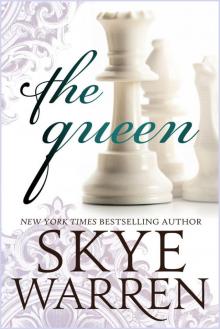 The Queen
The Queen Hear Me
Hear Me Below the Belt
Below the Belt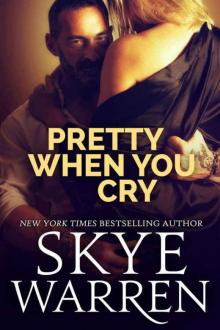 Pretty When You Cry
Pretty When You Cry Hold You Against Me
Hold You Against Me Beneath the Beauty
Beneath the Beauty Love the Way You Lie
Love the Way You Lie Dark Nights Boxed Set: The Complete Series
Dark Nights Boxed Set: The Complete Series The Prince
The Prince Deep
Deep Caught for Christmas
Caught for Christmas Wanderlust
Wanderlust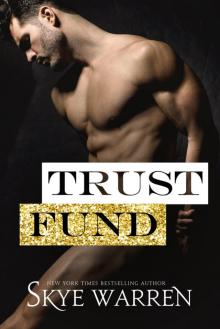 Trust Fund
Trust Fund On the Way Home
On the Way Home His for Christmas
His for Christmas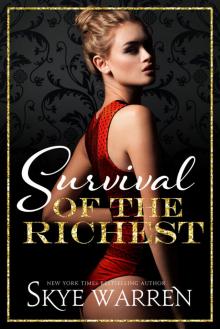 Mating Theory
Mating Theory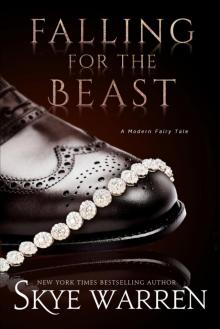 Falling for the Beast
Falling for the Beast Escort
Escort Take the Heat
Take the Heat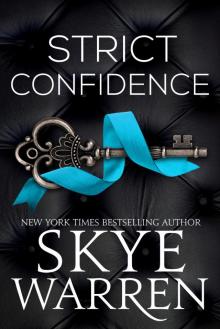 Strict Confidence
Strict Confidence Sonata
Sonata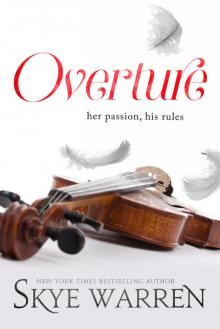 Overture
Overture Broken Beauty
Broken Beauty![[2018] Escort Read online](http://i1.bookreadfree.com/27/2018_escort_preview.jpg) [2018] Escort
[2018] Escort Beauty Touched the Beast
Beauty Touched the Beast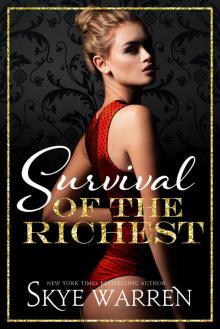 Survival of the Richest
Survival of the Richest Secret
Secret Audition
Audition Rough Hard Fierce, Chicago Underground 1-3 (Rough Hard Fierce)
Rough Hard Fierce, Chicago Underground 1-3 (Rough Hard Fierce) Best Kept Secret
Best Kept Secret The Bishop: A Tanglewood Novella
The Bishop: A Tanglewood Novella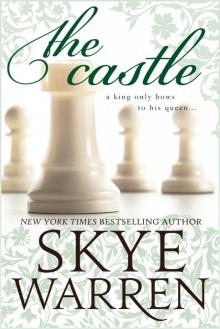 The Castle
The Castle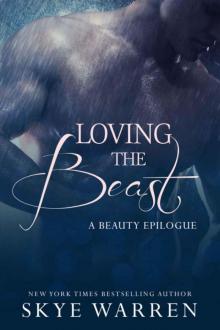 Loving the Beast
Loving the Beast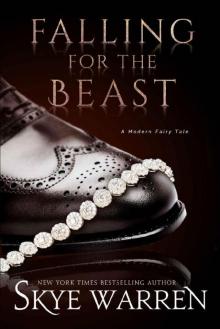 Falling for the Beast (A Modern Fairy Tale Duet Book 2)
Falling for the Beast (A Modern Fairy Tale Duet Book 2) Hidden Gem
Hidden Gem The Pawn and the Knight
The Pawn and the Knight![[2018] Survival of the Richest Read online](http://i1.bookreadfree.com/10/2018_survival_of_the_richest_preview.jpg) [2018] Survival of the Richest
[2018] Survival of the Richest Wild
Wild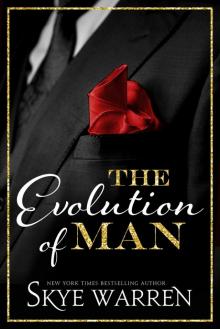 The Evolution of Man
The Evolution of Man Beauty Becomes You
Beauty Becomes You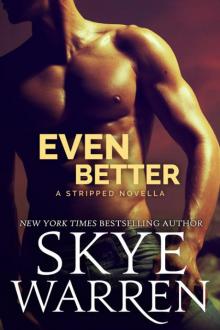 Even Better
Even Better Anti Hero
Anti Hero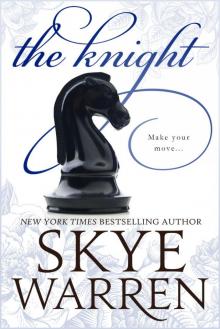 The Knight
The Knight Dirty
Dirty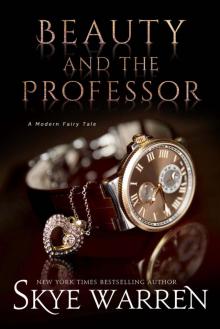 Beauty and the Professor
Beauty and the Professor To the Ends of the Earth
To the Ends of the Earth Sweet
Sweet Better When It Hurts
Better When It Hurts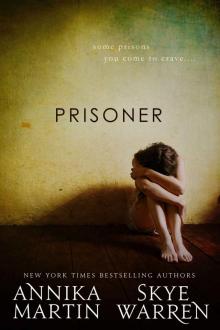 Prisoner
Prisoner Silver Lining
Silver Lining Take the Heat: A Criminal Romance Anthology
Take the Heat: A Criminal Romance Anthology To the Ends of the Earth (Stripped #5)
To the Ends of the Earth (Stripped #5) Diamond in the Rough
Diamond in the Rough Rough Hard Fierce
Rough Hard Fierce Hear Me (Dark Erotica)
Hear Me (Dark Erotica)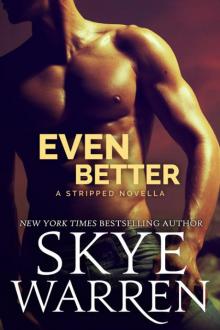 Even Better (Stripped #2.5)
Even Better (Stripped #2.5) We Wish You A Naughty Christmas: A Christmas Collection
We Wish You A Naughty Christmas: A Christmas Collection Hold You Against Me: A Stripped Standalone
Hold You Against Me: A Stripped Standalone